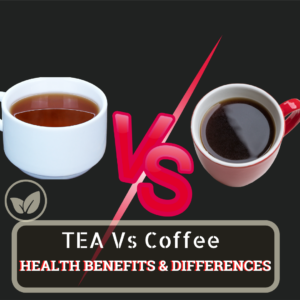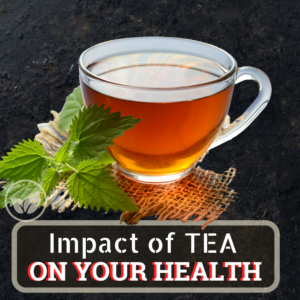
Is black coffee healthy for you?
There’s no denying the appeal of a fresh, steaming cup of black coffee; it doesn’t matter if you’re a die-hard coffee lover or a casual sipper.
There’s no doubting the allure of a fresh, steaming cup of black coffee.
But can you be sure that it’s good and healthy for you to consume? The answer is YES to both!
The unsweetened kind of coffee, known as black coffee, is rich in anti-oxidants and nutrients like riboflavin, pantothenic acid, and niacin.
To truly understand the answer to the question “Is black coffee good for you?”, We need to dig deeper.
I have taken time to put down everything you need to know about black coffee with proofs to support them.
Hang tight if you are interested to know the following :
Table of Contents
How black coffee can improve your health?

If you’re a coffee lover looking for a beverage that will help you take a more holistic approach to live a healthy lifestyle, black coffee is an excellent choice.
It’s well-known to offer many health benefits, and it’s often consumed because of its rich and bitter flavor.
Black coffee can improve your health in the following ways:
- Improved cognitive function: Caffeine, which is present in black coffee, has been found to improve mental alertness, focus, and performance. You may find that this aids in maintaining concentration and productivity throughout the day. [1]
- Reduced risk of cognitive decline and brain diseases: Recent research [2] suggests that the caffeine and antioxidants present in coffee may provide some protection against degenerative brain disorders like Parkinson’s and Alzheimer’s.
- Boosted metabolism: It has been established that drinking black coffee will speed up your metabolism and aid in fat burning. In the end, this can help you slim down and feel healthier all over.[3]
- Reduced risk of type 2 diabetes: A lower chance of developing type 2 diabetes has been linked to coffee intake, according to research. Coffee’s antioxidants, minerals, and possible role in enhanced insulin sensitivity all play a role.
- Lower risk of liver disease: Consumption of black coffee has also been associated with a reduced incidence of liver disease. Reasons for this include coffee’s anti-inflammatory and liver-protective properties.
- Reduced risk of certain types of cancer: The use of coffee may help lower the risk of some cancers, including liver and colorectal cancers, according to studies. Perhaps this is because coffee contains antioxidants that protect cells and reduce inflammation.
Black vs. other coffees: Which is healthier?
We’ve established that coffee is one of the most widely consumed drinks worldwide; there are wide varieties to choose from.
What are the health benefits of coffee? Is black coffee preferable to other forms of coffee? Let’s investigate this matter further.
Black coffee is only coffee beans and water, with no additives. It’s a low-calorie beverage with potential health benefits we’ve already covered.
Nonetheless, many variations of coffee beverages have sugar, cream, syrups, or other flavorings in addition to the coffee itself.
For example, the regular Caramel Frappuccino from Starbucks can have as much as 420 calories and 52 grams of sugar. Dunkin’ Donuts’ Frozen Caramel Coffee Coolatta can pack as much as 990 calories and 106 grams of sugar.
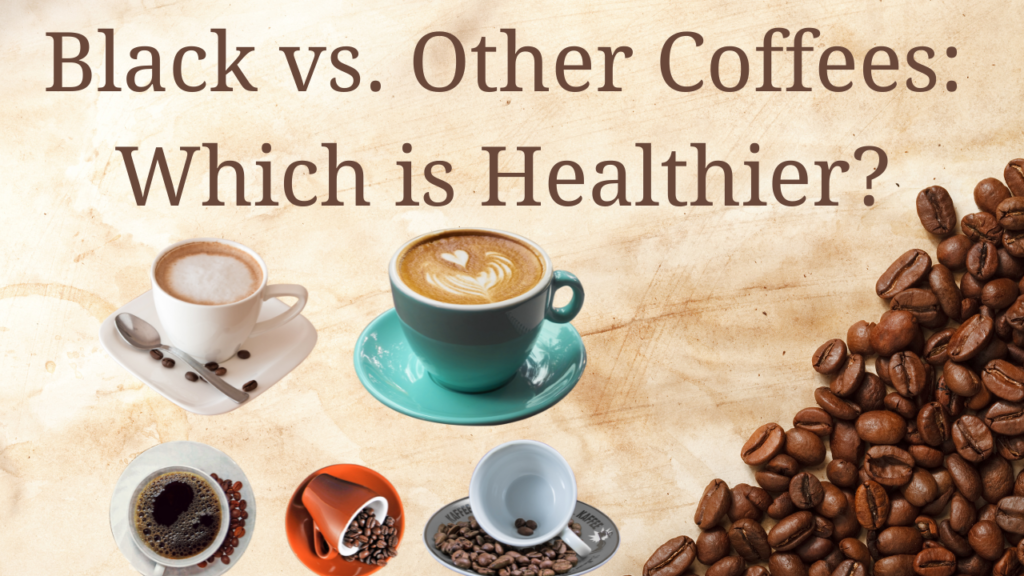
These beverages can be pretty unhealthy despite their delicious flavor.
Consuming a diet high in sugar and calories may lead to obesity, an increased risk of developing type 2 diabetes and other chronic diseases, and a host of other health issues.
So, black coffee is the best option if you want a healthy coffee beverage.
Instead of reaching for sugar or cream to satisfy your sweet need, consider sweetening your coffee with one of the many natural sugars available, such as honey or maple syrup.
You may also try a flavored black coffee beverage, like a latte or cappuccino, and enjoy its full flavor.
Making a few simple changes to your daily coffee routine will allow you to indulge in a wonderful and nutritious cup of coffee each and every time.
Black coffee and weight loss: What’s the connection?
You may have heard that drinking black coffee will aid in your goal of losing weight. But how exactly does drinking black coffee help you shed pounds?
To begin, we have already established that black coffee has fewer than 5 calories, zero sugar, and zero fat.
This means that switching to black coffee from sugary beverages like soda or juice will result in a caloric deficit.
It has also been discovered [4]that drinking black coffee can speed up the metabolism and enhance the rate at which fat is burned.
Caffeine in black coffee has been shown to enhance metabolic rate by as much as 11%, leading to increased caloric burn.
Also, it has the potential to excite the neural system and motivate the body to utilize stored fat as fuel.

Although drinking black coffee can help you feel full, it won’t cause you to lose weight on its own.
Consuming fewer calories than you burn via exercise and daily activities is the only way to lose weight.
However, drinking black coffee on a regular basis can aid weight loss by increasing metabolic rate and decreasing appetite.
Black coffee can help you lose weight, but only if you take it in moderation.
You should pay attention to your body and only drink coffee in moderation if you want to avoid the bad side effects, such as irritability, anxiety, and sleeplessness.
Black coffee pros and cons
While there are many positive aspects of drinking black coffee, there are also some potential drawbacks to keep in mind.
Let’s go through some of them.
Benefits of drinking black coffee:
- Boosts energy and alertness: Caffeine, found naturally in black coffee, is a stimulant that increases both mental and physical alertness and performance.
- Rich in antioxidants: Antioxidants in black coffee can protect your cells from free radical damage. Antioxidants suppress inflammation in the body.
- May reduce the risk of chronic diseases: Regular coffee use may lower the risk of chronic diseases such as type 2 diabetes, Alzheimer’s, and liver disease.
- Low in calories: Black coffee is almost calorie-free, making it a good weight-loss drink.
Drawbacks of drinking black coffee:
- May cause anxiety and jitters: Some people find that caffeine makes them nervous and jittery because of its stimulating effect on the body.
- May disrupt sleep: Caffeine consumption, particularly in the late afternoon and evening, has been linked to insomnia and poor sleep quality.
- Can cause digestive issues: Some people get acid reflux, heartburn, and other digestive disorders when they consume black coffee on an empty stomach.
- May increase blood pressure: Studies have shown that black coffee may raise blood pressure in some people, but it is generally safe for most people to drink.
Black coffee in moderation can boost energy and mental alertness, but it can also cause anxiety, poor sleep, and stomach troubles.
If you’re caffeine-sensitive or have underlying health issues, talk to your doctor about black coffee.
How black coffee can boost your metabolism
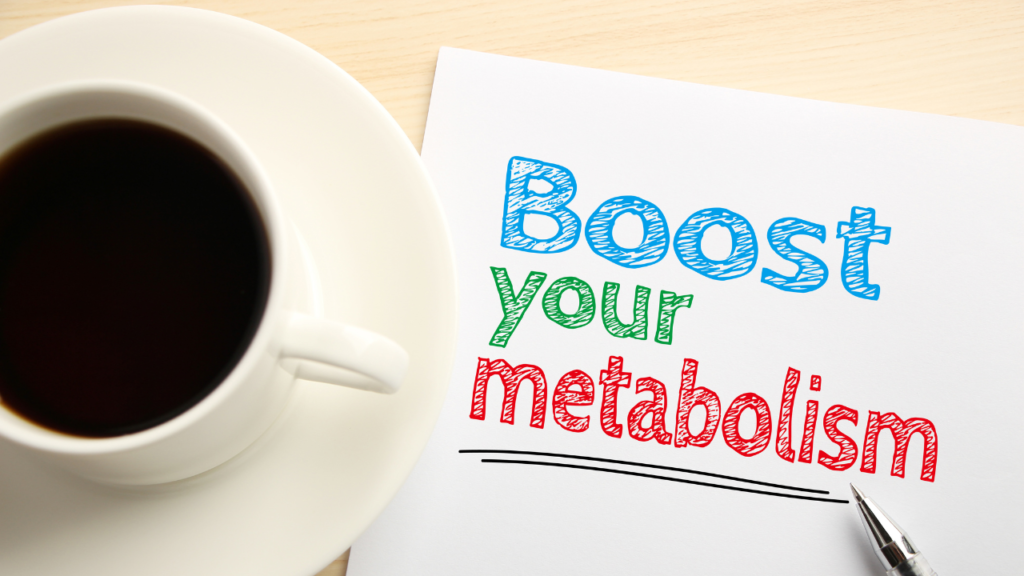
Having covered the above, are you familiar with the term “metabolism”?
It’s a fancy term for the process through which your body converts the calories you take into usable energy.
Black coffee is one beverage that does more than just perk you up and satisfy your taste buds; it also improves your body’s efficiency.
To explain, black coffee contains a substance known as caffeine, which has been shown to increase metabolic rate.
It means your metabolism can work more efficiently to convert food into energy.
Amazing, right? Black coffee’s chlorogenic acid may also aid your metabolism by reducing your body’s sugar absorption.
Black coffee has been shown to increase metabolic rate [5], but its effects will vary from person to person.
Even so, keeping your metabolism fired up by drinking black coffee can be a great strategy to boost your fat burning.
Try some black coffee the next time you want a refreshing beverage that will also offer you a boost of energy.
Does black coffee boost athletic performance?
For better or worse, athletes are always on the lookout for a competitive edge.
Caffeine, a stimulant that can enhance focus, alertness, and physical performance, is naturally present in black coffee.

Did you know that drinking black coffee before a workout or competition can help you do better and last longer?
Caffeine, which is in black coffee, is a special ingredient that can help you work out longer and feel less tired.
Caffeine is also good for strength athletes because it can help them get more power and strength out of their muscles.
So, if you want to get better at sports, drinking black coffee could be a good idea.
But that’s not all! The antioxidants in black coffee can also help your muscles heal faster after a hard workout.
This is because they can reduce swelling and help muscles heal faster.
But keep in mind that too much caffeine is bad for your health and performance.
So, if you’re sensitive to caffeine or worried about your health, you should drink black coffee in moderation.
Overall, black coffee can help athletes improve their performance as long as they don’t drink too much of it.
Train hard and keep yourself going with black coffee.
Black coffee and sleep quality
Black coffee contains a lot of caffeine, which may have a significant impact on how well you sleep.
Because of its stimulating effects, caffeine can make it hard to fall asleep and stay asleep.
Effects of black coffee on the quality of your night’s rest include:
- Disrupting your sleep cycle: Black coffee might disrupt your sleep cycle if you drink it too close to bedtime. Because it prevents you from falling asleep and so reducing the amount of deep sleep you get, caffeine might leave you feeling foggy and weary the following day.

- Interrupting REM sleep: Disruptions during rapid eye movement (REM) [6] sleep, the stage of sleep during which dreaming occurs and memory consolidation occurs, might have negative consequences for your health. Black coffee, especially if consumed too soon to bedtime, has been shown to decrease REM sleep, leaving you feeling less rested and attentive the following day.
- Worsening sleep disorders: Drinking black coffee may make sleep disorders, such as insomnia or sleep apnea, much more difficult to manage for those who already have trouble sleeping. Caffeine might make it difficult to get to sleep and remain asleep, leaving you tired and cranky during the day. [7]
Although a cup of black coffee first thing in the morning might do wonders for your productivity, you should try to restrict your caffeine intake throughout the day.
In order to have a good night’s rest, it’s best to limit caffeine intake throughout the day and stick to decaf or herbal tea in the afternoon and evening.
Is black coffee good for your skin?
Black coffee stimulates not only your body but also your skin. There are many positive effects of black coffee on the skin when consumed in moderation.

- Reducing inflammation: Antioxidants in black coffee can help minimize skin irritation, which can result in a more radiant, young appearance.[8]
- Boosting collagen production: The protein collagen plays an important role in maintaining the elasticity and firmness of the skin. Drinking black coffee has been shown to increase collagen formation, which in turn can lessen the visibility of fine lines and wrinkles.
- Improving circulation: Caffeine in black coffee has been shown to improve blood flow, allowing more oxygen and nutrients to reach the skin. A healthier lifestyle might lead to a glowing skin tone.[9],[10],[11]
- Reducing dark circles: Black coffee applied beneath the eyes can help diminish the look of puffiness. Caffeine is known to lessen inflammation and puffiness by narrowing blood vessels. [12]
While there are certain benefits to your skin from drinking black coffee, keep in mind that drinking too much caffeine can cause dehydration, which can have a bad effect on your skin.
Black coffee and its effects on anxiety and stress
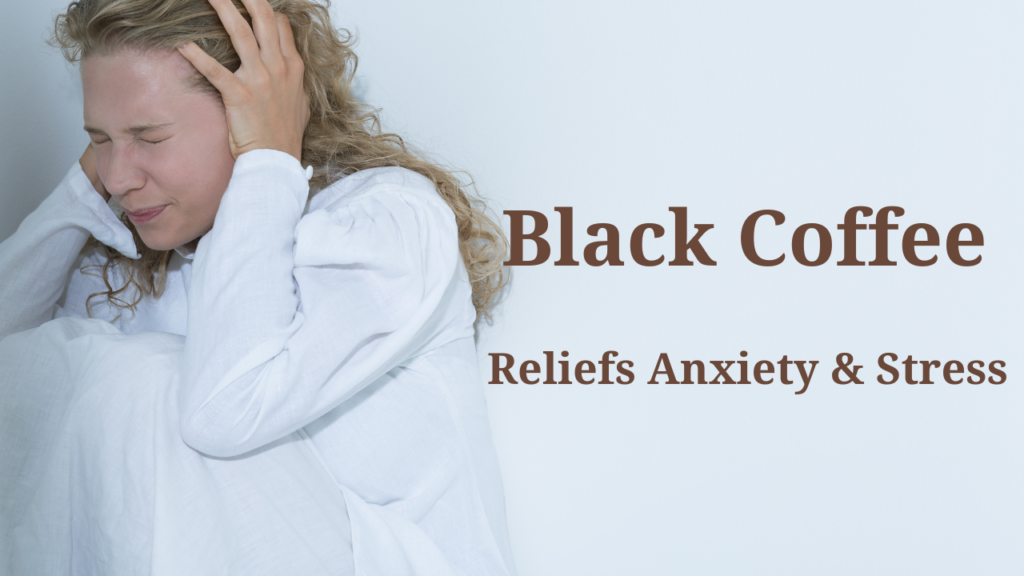
People drink black coffee to stay awake during the day. Black coffee may relieve anxiety and stress, however. Consider these crucial points:
Black coffee contains caffeine, which stimulates the central nervous system and releases dopamine and norepinephrine. Chemicals like these can boost mood and lessen stress.
Black coffee may also lower inflammation, which has been related to anxiety and depression.
Black coffee contains anti-inflammatory antioxidants like chlorogenic acid and quinides.
It’s important to note that excessive coffee use might actually worsen anxiety and jitteriness.
Black coffee should be used in moderation and with awareness of your caffeine tolerance.
Sugar and other sweeteners can also worsen mood and anxiety in black coffee. For stress and anxiety relief, drink black coffee without sweets.
Black coffee may help reduce anxiety and tension, but it should be consumed in moderation and without sweeteners to avoid side effects.
SEE ALSO:
Conclusion and Final thoughts

In conclusion, black coffee may increase metabolism and athletic performance and reduce the risk of chronic diseases.
It contains antioxidants and minerals that boost health. Nevertheless, adding sugar, cream, or other flavorings can reduce these health benefits.
If you want to boost your energy and wellness, try black coffee. Just remember moderation and watch your consumption.
As a coffee connoisseur, I recommend savoring the rich, nuanced flavors and smells of black coffee. Everyone can find a black coffee they like, whether it’s strong or moderate.
Have a freshly brewed cup of black coffee today in your favorite mug!

